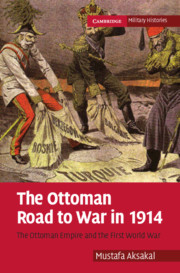Book contents
- Frontmatter
- Contents
- Acknowledgments
- Author's note
- Abbreviations
- Glossary
- Maps
- Introduction: pursuing sovereignty in the age of imperialism
- 1 The intellectual and emotional climate after the Balkan Wars
- 2 1914: war with Greece?
- 3 The Ottomans within the international order
- 4 The Great War as great opportunity: the Ottoman July Crisis
- 5 Tug of war: Penelope's game
- 6 Salvation through war?
- Conclusion: the decision for war remembered
- Bibliography
- Index
4 - The Great War as great opportunity: the Ottoman July Crisis
Published online by Cambridge University Press: 02 July 2009
- Frontmatter
- Contents
- Acknowledgments
- Author's note
- Abbreviations
- Glossary
- Maps
- Introduction: pursuing sovereignty in the age of imperialism
- 1 The intellectual and emotional climate after the Balkan Wars
- 2 1914: war with Greece?
- 3 The Ottomans within the international order
- 4 The Great War as great opportunity: the Ottoman July Crisis
- 5 Tug of war: Penelope's game
- 6 Salvation through war?
- Conclusion: the decision for war remembered
- Bibliography
- Index
Summary
As European armies took to the battlefields in early August 1914, Ottoman statesmen achieved a major diplomatic victory by forming a defensive alliance with the Great Power of their choice. The German Empire was widely considered to possess the best and strongest of the European land armies and the only one that might defend the empire against Russian designs on the Straits and eastern Anatolia. Ottoman statesmen, moreover, hoped that the war would be a short one and that the alliance, good until 1918 and renewable beyond that, would usher in a new period of relative Ottoman security during which the empire could be consolidated and its institutions modernized without fear of external threats. Once the Ottomans secured the alliance with Berlin, however, they found themselves engaged in a delicate balancing act. Hoping for a swift conclusion of the war, the Ottomans intended to enjoy the benefits of their Great Power alliance in peacetime without active military intervention.
German–Ottoman alliance negotiations during the July Crisis
In the weeks following the assassination of Franz Ferdinand and his wife Sophie in Sarajevo on June 28, 1914, the Habsburg government enlisted international support for sharp action against Serbia. Vienna saw in Istanbul's cooperation an invaluable instrument for influencing the policies of its Balkan neighbors, Bulgaria and Romania. Bulgarian support could prove crucial to Austria-Hungary because Bulgaria was in a position to open a second front against the Serbian army.
- Type
- Chapter
- Information
- The Ottoman Road to War in 1914The Ottoman Empire and the First World War, pp. 93 - 118Publisher: Cambridge University PressPrint publication year: 2008



